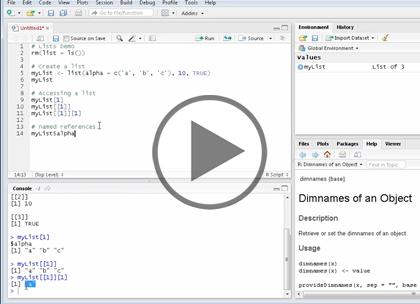Course description
Complex tasks require more complex variables—variables that contain multiple values, often of different types and ways to interact with these variables beyond simple assignments and value reads. R provides many more advanced types to handle these sorts of complex tasks, such as vectors, arrays, and lists. Explore these advanced types and learn how to create and use them in your code. Take a look at some of the functions R provides for working with advanced types and find out how using them will allow you to create elegant and efficient R solutions. See the operators in action, and become more comfortable with R.
Prerequisites
This course assumes that student has some programming experience and using a personal computer. No other experience is required.
Learning Paths
This course is part of the following LearnNowOnline SuccessPaths™:
Hadoop
Meet the expert
Kevin McCarty is a computer professional with over 30 years of experience in the industry as a programmer, project manager, database administrator, architect, and data scientist. He is a Microsoft Certified Trainer with over 25 individual certifications in programming and database technologies and serves as the chapter leader of the Boise SQL Server Users Group. A former Army officer and Eagle Scout, he holds a doctorate in Computer Science and a lifelong love of learning.
Course outline
Data Structures and Operators
Vectors (21:19)
- Introduction (00:36)
- Advanced Types (00:40)
- Vector Data Type (01:42)
- The c() Function (00:51)
- Vector Index (00:44)
- Negative Indexes (00:45)
- Numeric Index Vector (01:29)
- Logical Index Vector (00:38)
- Named Vector Members (02:16)
- Demo - Working with Vectors (00:10)
- Demo: Creating and Working with Vectors (05:04)
- Demo: Logical and Named Vectors (03:07)
- Exercise - Working with Vectors (00:42)
- Demo: Vector Solutions (01:45)
- Summary (00:42)
Matrices (22:00)
- Introduction (00:37)
- Matrix (00:41)
- Working with Matrics (01:30)
- Creating Matrices (00:45)
- Deconstruct a Matrix (00:37)
- Demo - Matrices (00:17)
- Demo: Creating and Working with Matrices (05:36)
- Demo: Named Matrices (04:15)
- Demo: Using Operators and Deconstruction (02:38)
- Exercise - Working with Matrices (01:02)
- Demo: Matrix Solutions (03:16)
- Summary (00:41)
Arrays (09:18)
- Introduction (00:37)
- Arrays (00:54)
- Accessing Arrays (01:23)
- Demo - Arrays (00:11)
- Demo: How R Handles Array Objects (05:45)
- Summary (00:26)
Lists And Factors (18:26)
- Introduction (00:37)
- Lists (01:31)
- Accessing Lists (01:15)
- Regarding List Slices (00:36)
- Simplifying vs. Preserving (01:24)
- Named List Slices (00:21)
- Demo - Lists (00:13)
- Demo: Creating and Accessing Lists (05:33)
- Exercise - Working with Lists (01:00)
- Demo: List Solutions (02:53)
- Factors (02:12)
- Summary (00:46)
Arithmetic And Relational Operators (18:04)
- Introduction (00:34)
- Operator Types (00:17)
- Arithmetic Operators (00:52)
- +, -, *, / Operators (00:23)
- %% Operator (00:19)
- %/% Operator (00:16)
- Vector Recycling (01:05)
- Demo - Arithmetic Operators (00:12)
- Demo: Operations on Integers and Vectors (04:36)
- Relational Operators (02:13)
- A Note on Equivalency (00:51)
- Demo – Relational Operators (00:14)
- Demo: Relational and Floating Point Comparisons (05:20)
- Summary (00:44)
Logical And Assignment Operators (11:08)
- Introduction (00:31)
- Logical Operators (02:22)
- Demo - Logical Operators (00:09)
- Demo: Logical Operators in Action (03:36)
- Assignment Operators (01:11)
- Difference Between <- and = (00:59)
- Miscellaneous Operators (01:23)
- Summary (00:54)



